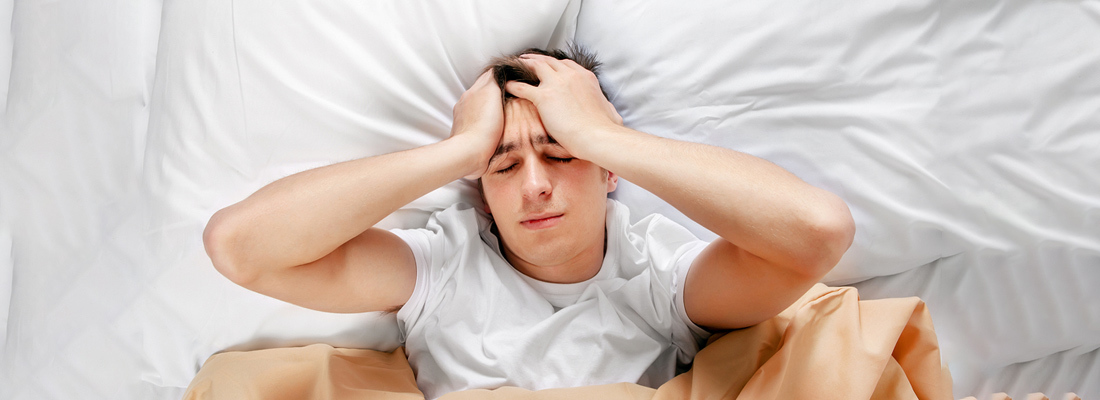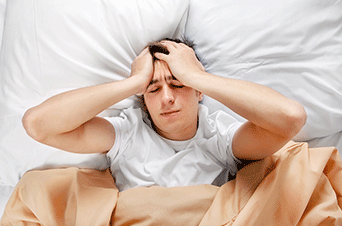
Lack of sleep can result in consistent headaches, impacting overall well-being and quality of life. Headaches from lack of sleep are a common issue, impacting millions of individuals globally. These headaches can span from mild or endurable discomfort to debilitating or excruciating pain. Moreover, sleep deprivation disrupts the body’s natural cycle and rhythms, leading to lack of sleep headaches.
Even though headaches from lack of sleep are a pressing concern, they still go unnoticed and often underestimated. Additionally, when the body does not receive adequate rest, it interrupts imperative processes such as, hormonal imbalance and pain perception. This imbalance can trigger headaches, which may vary in intensity and frequency, from tension headaches to migraines. The relationship between sleep and headache disorders is intricate. This relationship involves both physiological and psychological factors. As much as understanding the root causes of these headaches is important, it is equally crucial to work for effective solutions, implementing them.
Furthermore, these solutions are imperative for regaining overall health and improving daily functions. This comprehensive write-up will delve deep into the most asked question ‘can lack of sleep cause headaches?’ In addition to this, this guide will explore potential practical strategies to mitigate and prevent these headaches. So, keep scrolling to dive deep into the context!
Sleep Deprivation and Headaches—The Connection
Research indicates a strong link between lack of sleep and headaches. Even though this relationship remains baffling and not entirely clear, there are certain factors exhibiting a direct connection between the two. Headaches from lack of sleep are likely to arise from interruption in the body’s sleep-wake cycle. Additionally, various factors may contribute to the disturbance of circadian rhythms such as;
- Insufficient sleep
- Disrupted sleep
- Jet leg
- Sleep disorders
- Short or fragmented sleep windows
Moreover, lack of sleep can lead to adverse health effects, impairing the body’s ability to perform its functions. Several mechanisms involved in regulating the sleep cycle are believed to play a role in lack of sleep headaches. This may include;
- Chemical messengers like serotonin
- The glymphatic system
- Brain structures such as the brain stem and hypothalamus
Research suggests that disturbances in the hypothalamus can cause sleep disruptions, leading to primary headache disorders. These lack of sleep headaches may include migraines and tension headaches. Furthermore, this lack of sleep can trigger other symptoms, leaving an individual tired and groggy.
Causes of Headaches from Lack of Sleep
While there can be several strings attached to lack of sleep and headaches. Some of the most talked about causes are discussed below;
Disturbance in Circadian Rhythms:
Circadian rhythms are the body’s natural 24-hour cycles that regulate sleep-wake windows. Disruptions to these rhythms, such as inadequate sleep, getting too much sleep, or experiencing irregular sleep patterns can lead to lack of sleep headaches. When circadian rhythms are thrown out of balance, the body has difficulty maintaining its natural processes, resulting in headaches.
Hypothalamic Regulation:
Disruptions in the hypothalamus often lead to major headache disorders including migraines and tension headaches. Ever pondered ‘can lack of sleep cause headaches?’ The hypothalamus maintains and regulates sleep-wake cycles, simplifying the answer.
Sleep Disorders:
Often sleep disorders or conditions like sleep apnea, restless leg syndrome, and insomnia can disrupt sleep quality and duration. Moreover, headaches from lack of sleep can be caused by these sleep conditions hindering restful sleep. Furthermore, these sleep disorders often lead to fragmented sleep, which prevents the body from completing the necessary restorative processes. Hence, this disruption in sleep further triggers headaches.
Neurochemical Imbalance:
Neurotransmitters like serotonin play a crucial role in regulating sleep and wakefulness. In addition, lack of sleep can disrupt the balance of these chemical messengers, resulting in headaches. Imbalance in these neurochemical levels, particularly serotonin can trigger mood regulation, pain perception, and poor sleep. This in turn may result in sleep deprivation and headaches.
Headaches from Lack of Sleep—Prevention and Solutions
The connection between sleep and headaches is complex yet strong enough to impose adverse impacts on overall health and routine functions. However, these lack of sleep headaches can be prevented and resolved through remedies and lifestyle modifications. Furthermore, individuals can seek help and look for medical intervention in rare cases. Seeking help from a certified and skilled healthcare professional may work big time.
Some common preventions and solutions for headaches from lack of sleep are discussed below;
Improving Sleep Hygiene:
Creating an optimal sleep environment can enhance sleep quality while improving sleep disruptions simultaneously. This includes maintaining a cool, dark, and quiet bedroom, avoiding screens before bedtime, and establishing a relaxing pre-sleep routine. Therefore, good sleep hygiene practices can minimize disruptions and reduce headache frequency.
Managing Stress:
Stress and anxiety can interfere with sleep and trigger headaches. Moreover, incorporating stress management techniques such as mindfulness or meditation can improve sleep quality. This in turn helps in reducing headaches from lack of sleep and their frequency.
Establishing a Regular Sleep Schedule:
Establishing a regular sleep routine and maintaining it can help regulate the body’s natural cycle. Additionally, this consistent sleep routine can aid in reducing disruptions and improving sleep quality. This practice may contribute positively to reducing the occurrence of sleep-related headaches.
Keeping Check on Caffeine and Alcohol Intake:
Both caffeine and alcohol can disrupt sleep patterns, adding to lack of sleep headaches. Limiting the consumption of these substances, specifically before bedtime, can improve sleep quality, control sleep interruptions, and combat frequent headaches.
Timely Medical Interventions If Required:
Individuals with sleep disorders like insomnia or sleep apnea must seek timely medical treatments to mitigate sleep problems. Moreover, interventions such as CPAP for sleep apnea, CBT-I for insomnia, or medication for restless leg syndrome can help manage these conditions. These timely interventions can help reduce the intensity and frequency of associated headaches.
To Wrap Up
Headaches from lack of sleep are a prevalent issue that can significantly affect daily life and overall health. These headaches often stem from disruptions in circadian rhythms, neurochemical imbalances, and sleep disorders. Understanding the underlying causes and implementing effective solutions can help greatly in combatting these headaches. Furthermore, timely implications of either remedies, lifestyle modifications, or medical interventions can help manage sleep-related headaches. By prioritizing good sleep habits and addressing potential sleep disturbances, individuals can reduce the frequency and severity of headaches. These practices may lead to improved sleep, quality of life, and overall well-being.

